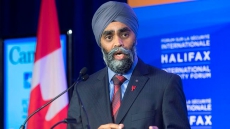TORONTO — A recent ruling branding miscarriages as a type of disability has the potential to change the way society tackles a stigmatized issue, survivors and experts say.
The Ontario Human Rights Tribunal delivered what is believed to be the first finding of its kind last month when it ruled that a miscarriage was an uncommon condition that could impact a woman's ability to function within society.
The case centred on a discrimination claim filed by Winnie Mou against her employer — an Ottawa-based project management firm known at the time as MHPM Project Leaders.
Mou alleged that she had been fired for missing performance targets due to medically related absences caused by both a deep tissue injury and a June 2013 miscarriage, and argued that both events constituted disabilities that the employer refused to accommodate.
MHPM argued that Mou did not suffer from a disability, since neither the injury nor the miscarriage were permanent or persistent conditions.
Tribunal vice-chair Jennifer Scott sided with Mou, stating in an interim decision that a miscarriage should not be viewed as a short-term condition.
"A miscarriage is not a common ailment, and it is certainly not transitory," Scott wrote.
"It is clear from the applicant's testimony that she continues to experience significant emotional distress from the miscarriage even today."
Samantha Webster had a similar experience upon miscarrying two babies within a few months in 2013.
The physical pain of losing unborn children, the grief of coping with those losses and the lack of understanding surrounding her experience left her feeling both debilitated and demoralized, she said, adding that she didn't leave the house for weeks.
"I felt like I couldn't talk about it... I thought I was the only person this happened to," Webster said in a telephone interview from Belleville, Ont. "I wanted people to know because I was so upset, but then you tell people and they say a whole bunch of things like, 'oh, at least it wasn't a real person' or 'at least you didn't know the baby yet.'"
Webster said she felt the issue was stigmatized among those who could not empathize, a feeling reinforced by lack of medical help. She said hospitals sent her home with nothing more than a pamphlet on miscarriage, while doctors indicated she would have to miscarry three times before they would administer tests.
Webster said the combination of emotional stress, stigma and isolation is comparable to what people with more recognized disabilities deal with every day.
Legally, comparable conditions have been handled in similar fashion. Christine Thomlinson, co-managing partner of employment law firm Rubin Thomlinson in Toronto, said the provincial courts that establish case law in this area have interpreted the Human Rights Code very broadly over the years.

While she said the definition may vary slightly according to the jurisdiction, she said issues ranging from obesity to drug addiction to depression have all been formally recognized as disabilities in Canada.
The latest tribunal ruling therefore did not come as a particular surprise, Thomlinson said. But she said the ruling will leave both employers and employees navigating a challenging grey area and force them to have conversations that have likely not been taking place on the job.
"What it will emphasize is that the accommodation process in the workplace is intended to be collaborative," Thomlinson said. "On the one hand, employees can take from this decision that they have an entitlement to be accommodated, but that can't go so far as to say there's an accommodation obligation if there's no information suggesting that you had a miscarriage."
Thomlinson described the ruling as a positive development overall, but questioned how uncommon miscarriages are. If there should be an influx of disability claims based on miscarriage, Thomlinson said employers may find themselves struggling to cope.
Figures from the American Pregnancy Association say eight to 20 per cent of pregnancies do terminate in the first 20 weeks, and 80 per cent of those end before 12 weeks.
Webster said not all women may struggle to come to terms with their miscarriages to the degree she and Mou have, adding those people may not feel the need to identify their pregnancy loss as a disability.
But the time is right, she said, for the issue to be addressed more openly for the many women who feel the need for greater understanding.
"You shouldn't have to make that claim if you don't need it, but if you do need it, at least it's there."





